A frenzied breeze whipped down Folsom Street in San Francisco's South of Market district as Tamara Hoffner sat among a row of scrappy tents and lit a cigarette not much longer than a stub.
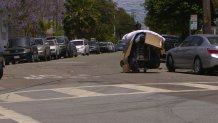
Hoffner has lived mostly on the streets for the last two-and-a-half years, occasionally taking a room in one of the city's single-room-occupancy hotels.
"When I get a room I come right back outside," Hoffner said. "I like being outside."
According to the city's annual homeless count, nearly 7,000 people in San Francisco live without a home. Every day Hoffner is joined by 3,500 other homeless people who will pull up a scrap of the city's 49 square miles to bed down, crafting lives from whatever is available.
"As long as I've known San Francisco there's always been a homeless problem," Hoffner said. "San Francisco is not going to ever change."
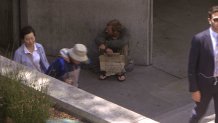
This year San Francisco will spend a record $241 million dollars on homeless services. Despite the city's efforts, its famous scenery and topography is filled with numerous visual cues of its tenacious homeless epidemic.
Clusters of tents sit along the streets of South of Market and beneath freeways. Panhandlers seem to be everywhere in the tourist areas of Union Square and Fisherman's Wharf. They hold cardboard signs at freeway offramps and along street medians. The frustration has swelled for business owners and residents tired of seeing encampments every time they step outside.
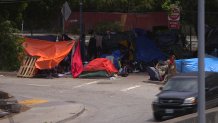
"Nobody deserves to go step over somebody when they come out of their building," said Vassie Brown who was walking with her grandmother in the city's Tenderloin, "just as well as they don't deserve to be sleeping on the street."
Local
Jennifer Friedenbach of the Coalition on Homelessness said between 2008 and 2014, San Francisco created 2,790 new housing units for homeless people. But in the next six years, the city is only going to add 632 new units for the homeless. Housing, she said, is the recipe for change.
"We've got to construct the housing," Friedenbach said. "We've got to have the housing subsidies, we've got to invest in a mental health treatment system."
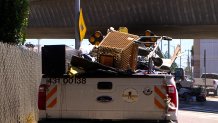
Friedenbach said every night, 800 sit on waiting lists for shelters. She said homeless families were a rapidly growing demographic given the city's skyrocketing cost of living with evictions becoming a gateway to homelessness.
She challenged the notion that many of the homeless don't want to be housed, and prefer to live outside.
"Giving people an opportunity to get off the street absolutely, they're going to do it," Friedenbach said.
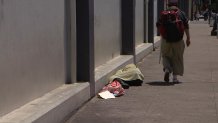
Near San Francisco's Mission Bay neighborhood, Ryan Palmer sat in camping chair among a sprawling tent city beneath the 280 Freeway. Palmer said he once worked for a Fortune 500 company but fell into a life of homelessness as a result of a drug problem, which has earned him 36 arrests.
He said he would like to find a job and move indoors, but at the same time, had become acclimated to a life beyond traditional structures. His encampment sat across the street from a new condo development under construction.
"Sometimes I look at these people going in these condos," Palmer said, "and say 'you're trapped and I'm not."
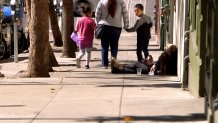
San Francisco has found some recent success transitioning homeless into housing through its "navigation Center," an all-in-one service that combines temporary housing with social services, meals and laundry.
The city is aiming to add six more navigation centers in addition to its current facility on16th and Mission Streets. A stay in the Navigation Center has been a coveted opportunity among the homeless, but spaces are limited to about 150 people at a time.
"It seems like it's taking forever to get into navigation," said Hoffner who is on the center's waiting list.
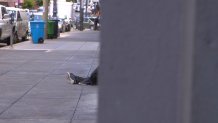
Some community advocates believe the city is on the right track by opening the new centers, and working to add more affordable housing.
"Every other major West Coast city from Seattle to San Diego has seen their homeless population go up where San Francisco stayed flat," said Gail Gilman, director of the Community Housing Partnership. "So I think we are doing things that work."
Friedenbach, however, said the city's rising evictions have increasingly thrust the city's poor into an untenable situation where life in the streets has become the only option.
"People are staying homeless longer, more San Franciscans are becoming homeless," Fridenbach said, "and it's becoming more and more difficult to get off the streets."
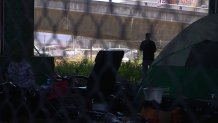
In Civic Center plaza, Gerald Robinson sat on a bicycle taking-in the smattering of street dwellers stretched out on the grass, bags of belongings and shopping carts perched nearby. Robinson said he has lived off-and-on in the streets and was currently staying with friends in Bayview-Hunters Point. He shook his head at the sight of homeless languishing in seemingly every direction.
"Everybody's surviving," Robinson said, "and doing whatever they can to make it out here."



